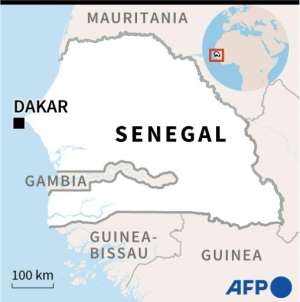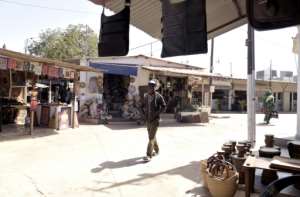
[ad_1]
An eruption of protests in Senegal has highlighted simmering frustrations over unemployment and a year of coronavirus restrictions.
Usually seen as a haven of stability in unstable West Africa, Senegal was rocked by a week of clashes between opposition supporters and the police in early March.
At least five people have been killed in the unrest, sparked by the arrest of opposition leader Ousmane Sonko, a government critic popular with young Senegalese.
But many argue that anger has also boiled over over deepening poverty in the country of 16 million people, especially among young people.
 Senegal. By Tupac POINTU (AFP)
Senegal. By Tupac POINTU (AFP) “The Senegalese have had enough because they are hungry,” said Gorra Sarr, 42, who sells colorful, handmade bags at a craft market in the capital Dakar.
He explained that tourists no longer visit the once bustling market, but many artisans still come to their stores, at their own expense, hoping to make a sale.
“It’s not easy, but we are surviving,” Sarr said.
Senegal’s economy was growing before the pandemic, with its GDP increasing 5.3% in 2019, according to the International Monetary Fund (IMF).
However, although the IMF predicts a recovery this year after a slowdown in 2020, coronavirus restrictions have ravaged Senegal’s large informal sector, and a growing number of people are struggling to make ends meet.
About 40 percent of Senegalese live in poverty, according to the World Bank.
Increase in poverty
Demba Moussa Dembele, a Senegalese economist, told AFP he estimated that around two million people have fallen into poverty since the onset of the coronavirus crisis.
The pandemic has not only hit the hospitality and tourism industries, he said, but has also reduced foreign remittances which account for around 10% of the country’s GDP.
Huge flooding in September in several parts of Senegal, including Dakar, also pushed many people into poverty, Dembele said.
 Empty: The Soumbedioune artisanal market in Dakar bears witness to the impact of Covid on the Senegalese tourism industry. By Seyllou (AFP)
Empty: The Soumbedioune artisanal market in Dakar bears witness to the impact of Covid on the Senegalese tourism industry. By Seyllou (AFP) The Senegalese government has responded to the pandemic by banning business layoffs, giving tax breaks to struggling businesses and distributing food.
Yet the number of people who say they struggle is striking.
The Senegalese statistics agency said in September that 85% of households had seen their incomes drop since last March, for example.
He also revealed that 36% of household heads surveyed had stopped working, with around a third of that number stating the coronavirus crisis as the reason.
Another sign of economic gloom, Senegal experienced at the end of last year an increase in the number of migrants trying to reach Europe via a perilous ocean voyage aboard rickety traditional canoes.
At least 140 migrants died when one of these ships sank in southern Senegal in December.
Many recent migrants from Senegal came from coastal communities affected by declining catches and virus-related restrictions in fish markets.
‘Despair’
Yves Nzale, the coordinator of an association of unemployed Senegalese graduates, said there was little hope for young people in the country.
Senegal produces about 300,000 university graduates a year, he said, of whom about 100,000 manage to find jobs.
 Workers argue in the market stalls – many enter, at cost, hoping to entrap the occasional shopper. By Seyllou (AFP)
Workers argue in the market stalls – many enter, at cost, hoping to entrap the occasional shopper. By Seyllou (AFP) “Young people feel abandoned,” he said. “It’s a situation of desperation.”
Senegal adopted in 2012 a strategy to fight poverty in the country, which involves, among other things, the development of infrastructure and the promotion of investments.
However, Charles Robertson, the global chief economist at investment bank Renaissance Capital, said the investment-driven business model has created growth, but not necessarily jobs.
“Senegal looks good in terms of macro numbers, but it won’t have been fantastic for the man or woman on the street,” he said.
Robertson explained, for example, that building bridges or roads tends not to create jobs in the short term.
He added that industrialization usually creates jobs, but Senegal is unlikely to become an industrial success story until it resolves its low adult literacy rate of around 50 percent.
Source link